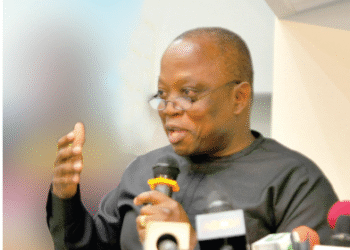The Acting Director-General of the National Service Authority (NSA), Felix Gyamfi, has been reassigned to the Ministry of Finance with immediate effect, just seven months after his appointment. His deputy, Ruth Seddoh, has been elevated to serve as Acting Director-General in his stead.
The unexpected changes were confirmed on Monday, September 8 2025, though the Presidency has yet to issue an official explanation. Sources within the Jubilee House, however, suggest that the reshuffle forms part of President John Dramani Mahama’s broader efforts to strengthen the Reset Agenda by re-aligning leadership across key state institutions.
While insiders frame the move as routine within the government’s evolving strategy, media reports point to operational challenges at the NSA as a major factor.
In particular, the delays in the posting of this year’s batch of national service personnel, which stemmed from irregularities discovered in the Authority’s digital deployment platform, are said to have weighed heavily in the decision.
The NSA’s online system, known as the metric app, came under intense scrutiny after a forensic audit uncovered startling anomalies in its records. On June 18, 2025, the Ministry of Youth Development and Empowerment announced the immediate suspension of the Central Management System (CMS), which had been the backbone of national service postings.

The suspension, issued under direct instructions from the Presidency, paved the way for a sweeping audit into allegations of widespread fraud in the posting process.
Audit Findings
The findings of the audit painted a damning picture. Among the irregularities, investigators discovered that personnel aged over 100 years — including individuals as old as 1,027 years — had been drawing allowances.
Payments to these fictitious names amounted to GH¢115,037. Even more bizarre, persons between the ages of zero and 10 years were also found on the payroll, with 1,570 transactions totaling GH¢889,977.
For years, the scandal of “ghost names” has haunted the National Service Authority, formerly known as the National Service Scheme, draining the public purse and undermining confidence in the institution’s integrity.
The Mahama administration has pledged to eradicate the phenomenon under the Reset Agenda, with a strong emphasis on digital reforms, transparency, and accountability.
In response to the audit findings, the NSA Board established a seven-member committee tasked with designing a new digital platform that would close the loopholes exploited by fraudsters.

Policy Disagreement
This decision, however, is believed to have sparked friction at the top of the Authority. According to reports, Mr. Gyamfi clashed with his supervising Minister, George Opare Addo, over the best way forward.
While Minister Opare Addo is said to have strongly advocated for a fresh portal to replace the compromised system entirely, Mr. Gyamfi reportedly maintained that the existing platform could be salvaged and strengthened with additional security features.
This policy disagreement is thought to have deepened tensions, even as the government sought a swift resolution to restore public confidence in the posting process.
Against this backdrop, Mr. Gyamfi’s reassignment is being interpreted by some as an effort to defuse the impasse and inject fresh leadership into the troubled institution.
His new role at the Ministry of Finance has not yet been clarified, though it aligns with the administration’s ongoing reshuffle aimed at repositioning experienced officials in areas deemed critical to economic recovery.
For Ruth Seddoh, the incoming Acting Director-General, the task ahead is formidable. She inherits an Authority still reeling from scandal and under public pressure to ensure that the upcoming postings of service personnel are free from irregularities.

Her immediate priority will be to restore confidence in the institution by overseeing the development and rollout of a new, fraud-proof digital deployment system.
The developments at the NSA highlight the broader challenges facing President Mahama’s Reset Agenda. While the administration has signaled a zero-tolerance approach to corruption and inefficiency, the practical work of reforming state agencies is already proving complex and politically sensitive.
The case of Mr. Gyamfi’s reassignment underscores how entrenched problems, such as the ghost names scandal, continue to test the resilience of institutions meant to serve the public.
As the dust settles, attention will now turn to whether the NSA under Ms. Seddoh can deliver a credible and transparent service posting process in the coming months. For thousands of graduates awaiting their national service assignments, the success of these reforms will be the true measure of change.
READ ALSO: Oil Prices Rebound Over $1 as OPEC+ Output Hike Seen as Modest























